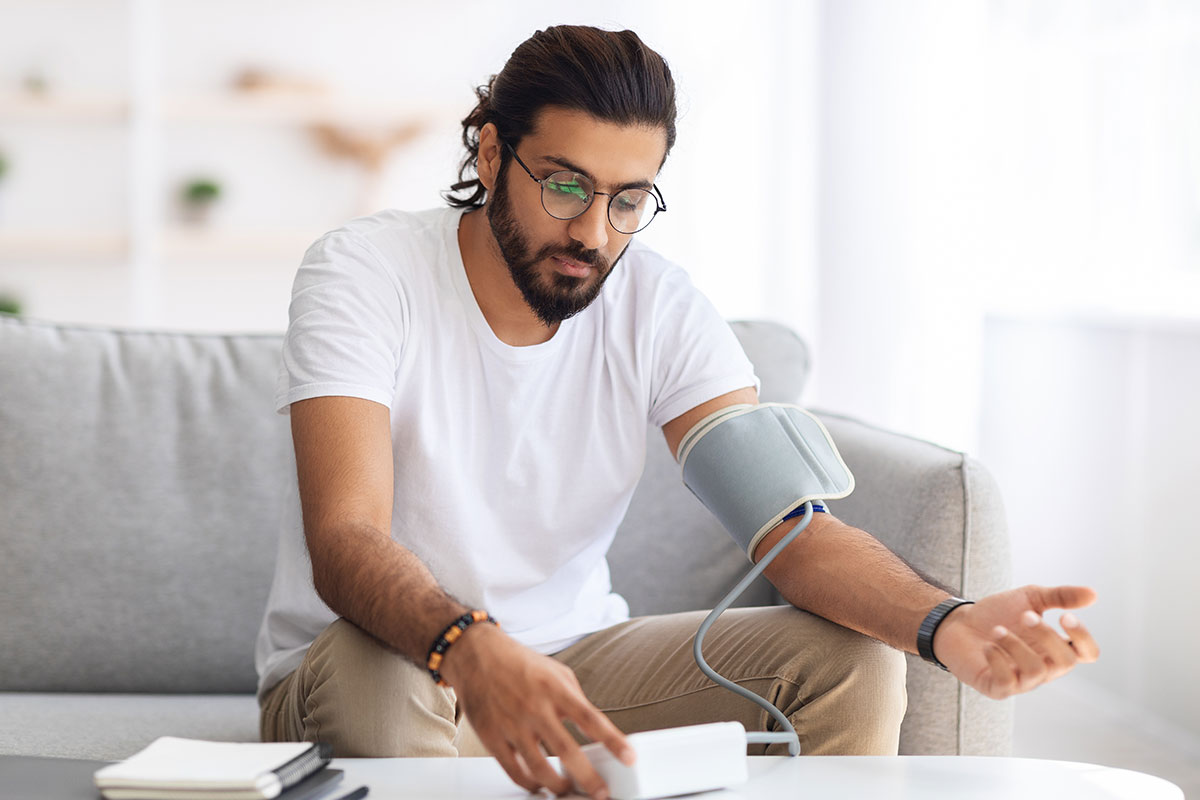
Snoring is detrimental to more than just a good night’s sleep. It also has health and medical implications, and among these is high blood pressure.
While sleep apnoea is particularly associated with high blood pressure, snoring is also a significant contributor to the development and worsening of this serious medical condition.
What is Blood Pressure?
Blood Pressure is the measurement of the force of the blood on the inner arterial walls as the heart pumps oxygenated blood from the lungs around the body. It changes throughout the day depending on your age, general health, body mass, unique physiology, activity level, stress level, caffeine intake, medications, and numerous other factors.
Blood pressure is measured in units of mmHg, or millimetres of mercury. This is based on when it was traditionally measured using a device called a sphygmomanometer and a stethoscope. Most clinics and hospitals now use electronic/digital blood pressure reading devices.
Blood pressure measurement is comprised of:
- Systolic Pressure – highest, occurs when the heart beats and squeezes blood into the arteries.
- Diastolic Pressure – lowest, when the heart rests and the arteries relax and refill with blood between beats.
The reading of blood pressure is the systolic pressure over the diastolic pressure. Healthy blood pressure in most adults is considered to be an average of 120 systolic over 80 diastolic mmHg.
High Blood Pressure…
Hypertension or high blood pressure occurs when the blood pressure is higher than the normal healthy parameters. (Low blood pressure of below 100/70 mm Hg is also of medical concern, but it is less common and has different causes).
Any adult with blood pressure consistently of 130-140/90 mmHg is considered to have high blood pressure.
Blood pressure with any reading above 180/120 is critically high and requires immediate, emergency medical care.
Randomly high blood pressure readings are not necessarily a cause for concern, especially if you are otherwise healthy and have no other risk factors (e.g., obesity, diabetes, heart disease, kidney disease). Some people’s blood pressure automatically rises when they are in a clinical environment (this is called White Coat Syndrome) and it also rises somewhat during and just after exercise, consuming caffeine, smoking, and in response to other things.
The most accurate determination of blood pressure can be acquired using a 24-hour ambulatory blood pressure monitor, which is worn for 24 hours and takes measurements at 30-minute intervals.
Why is High Blood Pressure a Problem?
Hypertension is widely referred to as a “silent killer”. It typically causes no symptoms, but if not managed/treated, it can directly lead to other health conditions and even death. Long-term, ongoing high blood pressure causes the heart to work much harder and may lead to heart disease, heart attack, stroke, irreversible blood vessel damage, kidney failure, and other medical conditions.
According to The Australian Heart Foundation (2023):
- At least 15% of Australians unknowingly have high blood pressure
- Up to 67% of people have never had their blood pressure checked
- 60% of people with high blood pressure are also at a substantial risk of diabetes
Primary hypertension is the most common type of high blood pressure, and it usually develops with age. It often also runs in families. Secondary hypertension arises as a consequence of another medical condition or medication/drug. It usually resolves with treatment of the causative condition or by stopping the medicine.
How Does Snoring Contribute?
People who snore are predisposed to developing high blood pressure, and regular snoring is associated with uncontrolled high blood pressure, even in the presence of anti-hypertensive drug treatments.
Blood carries oxygen and other nutrients from the lungs throughout the body, and snoring indicates that breathing during sleep is not as efficient as it should be. As such, inadequate oxygen reaches the lungs and is therefore not available for transport through the blood. In turn, this makes the heart beat faster and harder as the body strives to adapt and acquire the oxygen it needs.
The extra load on the heart over-stresses it, potentially causing heart failure. It also impacts the blood vessels, which may harden, leak, burst, or develop clots or other blockages. These can cause heart attack, stroke, and other medical issues.
Preventing & Managing High Blood Pressure
Blood pressure management includes:
- Have a complete medical checkup annually, including blood pressure checks. You can also have an on-the-spot blood pressure check at many pharmacies.
- Lifestyle changes include stress management, losing weight, a healthy diet, reducing salt intake, exercise, moderating or avoiding alcohol consumption, treating Metabolic Syndrome, getting enough sleep, and increasing water intake.
- Avoiding substances that increase blood pressure, such as caffeine, tobacco, and vapes, and say no to illicit drugs.
- Managing blood cholesterol and triglyceride levels, as well as blood sugar levels and maintaining optimal insulin sensitivity.
- At a certain level, and if lifestyle modifications are unsuccessful, your doctor may prescribe medicines to help control blood pressure. Several different types of these are available and they work in different ways.
- Results from myriad clinical studies have found that treating snoring and sleep apnoea appropriately can also help treat high blood pressure – both the implications associated with it as well as its development and worsening. Treating these is even effective for people with hypertension that is resistant to lifestyle changes and drug therapies.
For people who have simple snoring, using an oral anti-snoring appliance like SnoreMD can make all the difference.
Stop Snoring and Reduce Blood Pressure
Reducing snoring plays an important role in one’s general health and can, alongside other healthy lifestyle choices, help prevent high blood pressure from developing or worsening.
One of the most effective ways to stop snoring is to use SnoreMD. This anti-snoring device is medically designed and patented and is worn in the mouth while you sleep. Comfortable and safe to use for adults over the age of eighteen years, its unique adjustment feature works by gently moving the lower jaw slightly forward. The slight repositioning of the mouth opens the airways and prevents the tissue vibrations that cause snoring. It also provides more oxygen for the body and thus takes some of the load off the heart and blood vessels.
There is no more efficient, budget-friendly, unintrusive solution for snoring than SnoreMD.
Understand more about SnoreMD and buy yours now.


